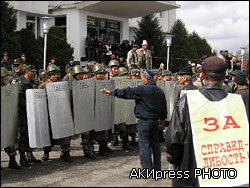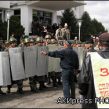
Kyrgyz Crisis Reaches Bishkek — Rumors Suggest Akayev has Fled Country
Publication: Eurasia Daily Monitor Volume: 2 Issue: 55
By:

One week after runoff elections for parliament, the government of Kyrgyzstan lost administrative control over all large cities in the southern part of the country to opposition protesters. On March 20, for the first time since the bloody events in Aksy in 2001, the Kyrgyz government deployed internal troops to suppress civilian protesters in Jalalabad and Osh. The clashes have left at least four dead and dozens wounded. President Askar Akayev’s government is facing its biggest political crisis since independence.
The Kyrgyz public has never mobilized in such numbers and the number of protesters is increasing every day. On March 19, 3,000 people gathered outside the capital, Bishkek, demanding cancellation of the elections and calling for Akayev’s resignation. A record 50,000 people turned out in Jalalabad. The demonstrations coincide with Nooruz, a popular national celebration on March 21.
Early yesterday (March 20) morning, OMON internal troops stormed buildings occupied by protesters in Jalalabad and Osh. Opposition leaders Anvar Artykov and Dujshenkul Chotonov were among the more than 160 protesters arrested. The governor of Jalalabad oblast, Jusupbek Sharipov, denied reports of casualties, saying, “The opposition is dramatizing the situation” (Kyrgyzinfo.kg, March 20). The protestors have re-grouped and deployed 1,700 men on horseback in Jalalabad’s suburbs (IWPR, March 20). According to recent reports, the protesters in the south are now heading to occupy Osh-3000, a state-financed television station, and the Jalalabad airport.
Akayev has made no public statement since last Monday (March 14), when he appeared on national television to declare the elections a success and condemn the opposition. According to Res Publica (March 19), unconfirmed sources report that President Akayev has secretly fled the country with his family — the first lady and the two children who recently won seats in parliament. Opposition leader Roza Otunbayeva confirmed the news (Fergana.ru, March 20).
Prime Minister Nikolai Tanayev is ready to start negotiations with the Jalalabad protestors (Kabar, March 19). Meanwhile, opposition leaders are calling for the seizure of government buildings in Bishkek this week.
The Kyrgyz opposition has long been fragmented into personality-based groups rather than ideological factions. These rivalries have kept the opposition from scoring any major successes in the past. However, now some former pro-presidential figures, including representatives of the Kyrgyz Foreign Service, are openly backing the opposition. For example, Melis Eshimkamov, a newspaper editor and unsuccessful candidate for parliament, has switched loyalty from Alga Kyrgyzstan, the party headed by the president’s daughter Bermet Akayeva, and spoken out against President Akayev, accusing him of corruption and authoritarianism (Akipress, March 18).
Early last week Kyrgyzstan seemed to be divided into a politically active “south” and passive north, including Bishkek. To date, the protesters have occupied seven regional administrations in the southern cities of Jalalabad, Uzgen, Osh, Kochkor, and the northern city Talas, the birthplace of First Lady Mairam Akayeva. One reason Bishkek remained calm is the fact that the country’s major businesses are concentrated in the capital. High rates of corruption among business circles and informal ties with the government discourage Kyrgyz entrepreneurs from protesting. There are also many state employees living in Bishkek who received increased attention from the government in the run up to the election.
According to the Bishkek militia, 80 unsanctioned meetings were organized in different parts of the city during the last month (Kabar, March 19). City law-enforcement agencies are now on high alert, while militia units are spread across the main streets and connecting routes to Bishkek to thwart any mass movement of people from other regions. Earlier this year the Interior Ministry secretly conducted a series of special training exercises in techniques for crowd control and imposing a state of emergency (Moya stolitsa novosti, January 28).
Meanwhile, U.S. Ambassador Steven Young continues to be one of the most vocal critics of the elections and the Kyrgyz government’s suppression of free speech. On March 19, several news agencies published a phony report allegedly from the U.S. Embassy in Bishkek that contained defamatory statements about the political situation in Kyrgyzstan and the activity of top Kyrgyz politicians. The U.S. Embassy officially denied the report, but the incident sparked wide discussions. A number of Internet journals in Kyrgyzstan are still suffering hacker attacks, including cetnrasia.org and gazeta.kg, two sites famous for their anti-Akayev publications (Ferghana.ru, March 20). Access to these websites has been intermittent since March 13.
The situation in Kyrgyzstan has already parted with the peaceful popular revolutions in Georgia and Ukraine. Reports of beatings, arsons, mass arrests, and deaths in the process of revolutionary mobilization against the current regime have raised immense distress among Kyrgyz at home and abroad. The Kyrgyz diaspora are joining anti-Akayev protests today (Monday 21) in front of Kyrgyz embassies and consulates in Washington, DC, Chicago, New York, Brussels, London, and Moscow. As one Kyrgyz graduate student in Washington, DC summed up the situation, “I feel guilty of being a mere observer when the entire country is in protest.”




